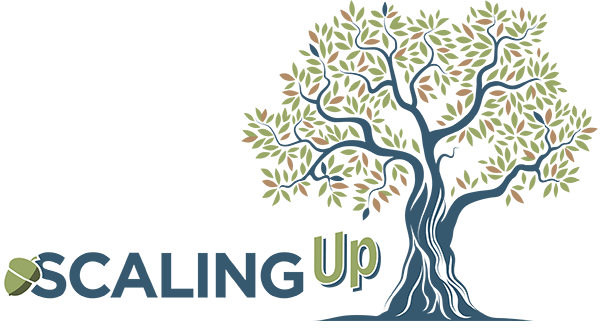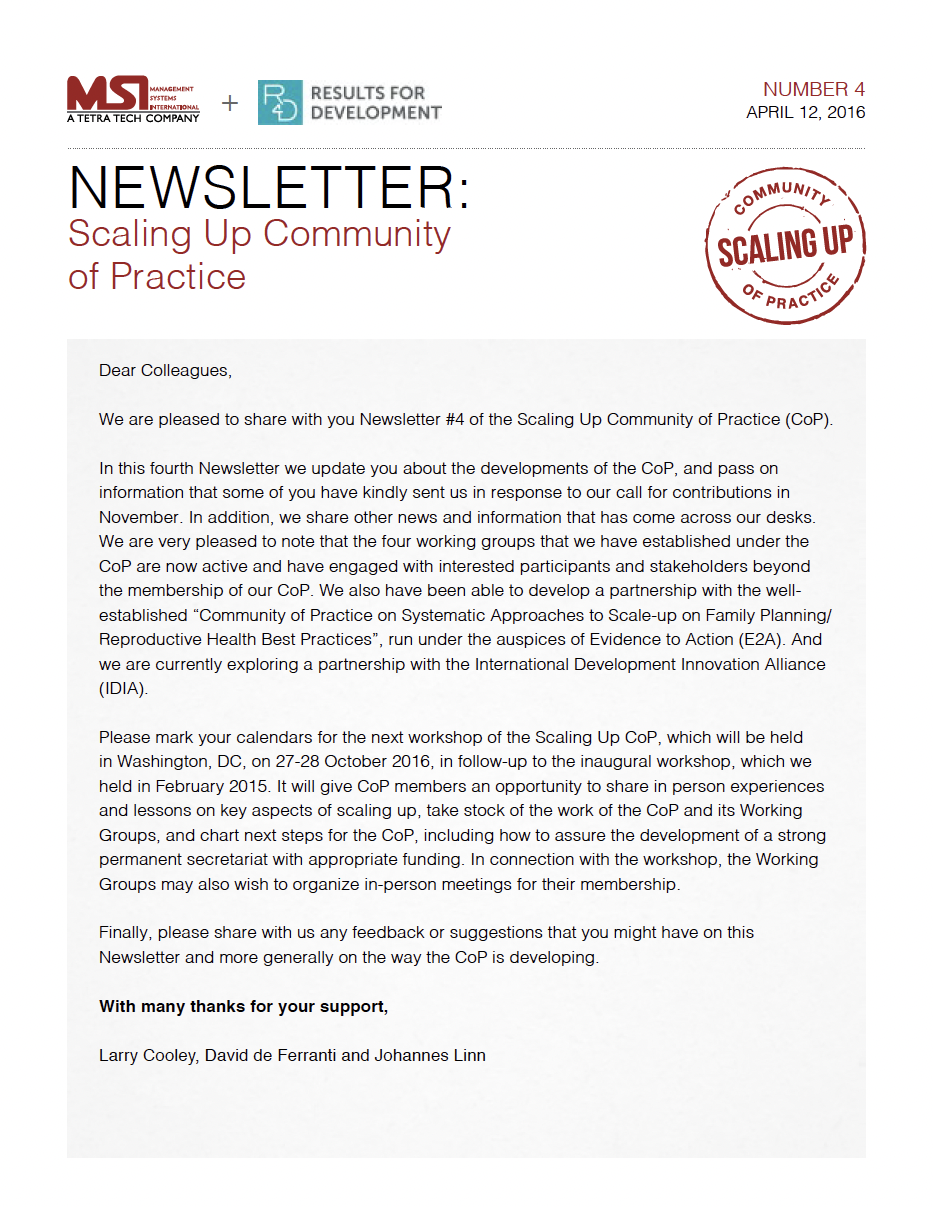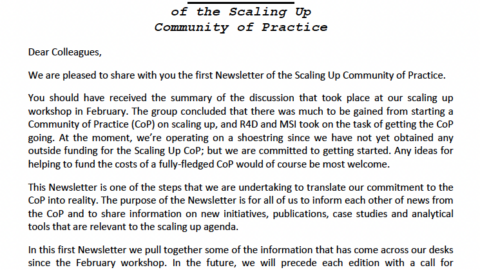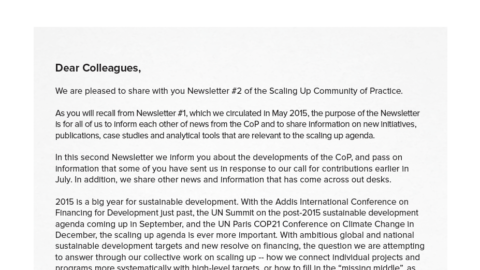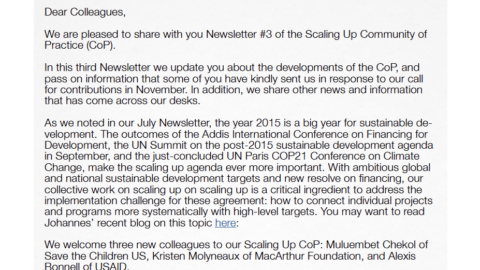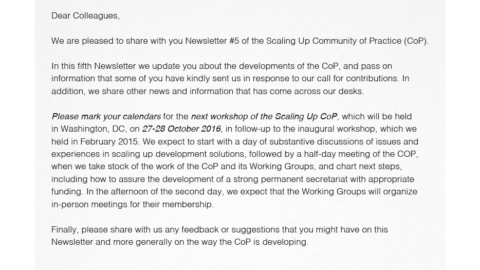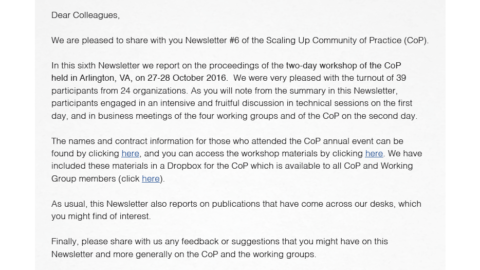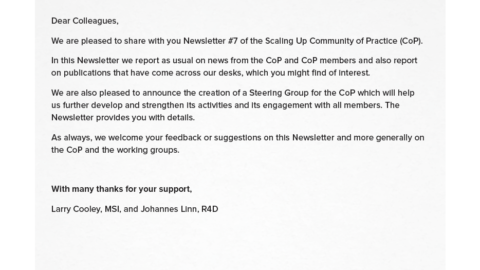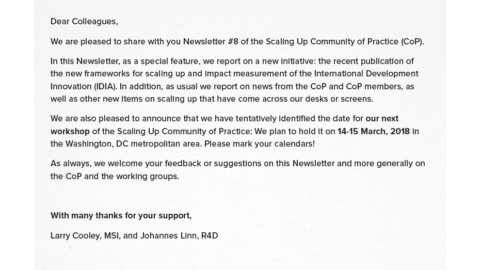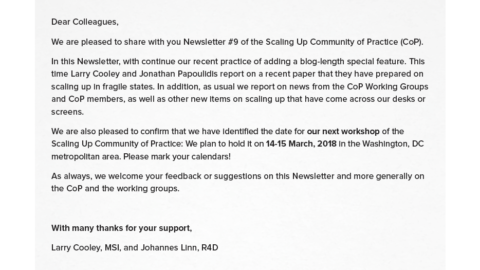News of the Scaling Up Community of Practice
Sectoral and Thematic Working Groups Update
There has been progress in organizing four Working Groups on scaling up in regard to selected topics. Below is a summary of the initiatives currently underway. If you would like to join one or more of these Working Groups, please contact the lead organizers. We will be exploring other topics in the future based on interest from CoP members.
We also have established a partnership with the “Community of Practice on Systematic Approaches to Scale-up on Family Planning/Reproductive Health Best Practices”, run under the auspices of Evidence to Action (E2A). The Community of Practice has been in existence for a few years and has gathered valuable experience on how to manage a network of institutions and experts with an interest in scaling up in a particular thematic area. It has agreed to liaise its work with that of our Scaling Up CoP. It is our hope and intention that the group function, in effect, as a fifth Working Group of the Scaling Up CoP and that its membership be open to current Scaling Up CoP member institutions. We will report in the next Newsletter on specific arrangements for joining this Working Group.
| Working group topic | Lead organizer/contact | Brief description |
|---|---|---|
| Scaling up in education | Molly Eberhardt (R4D) meberhardt@r4d.org Caitlin Moss (R4D) cmoss@r4d.org | The Education Working Group held its first quarterly call on January 25th, which included member introductions and a discussion of challenges and knowledge gaps in our collective understanding of scaling up quality education. R4D also conducted a survey to identify priority actions for the group, which will be discussed further during our first in-person meeting on April 20th. This meeting will also highlight recent work of relevance, including two upcoming reports: “Millions Learning: Scaling Up Quality Education in Developing Countries,” a new report from Brookings that comprehensively scopes what has worked to scale up quality learning, and an upcoming report from a collaboration between the Center for Education Innovations (CEI) and UNICEF, which documents the scale up journeys of promising education innovations. |
| Scaling up in fragile states | Larry Cooley (MSI) LCooley@msi-inc.org Jonathan Papoulidis (World Vision) jpapouli@worldvision.org | World Vision and MSI are collaborating on a paper on scaling up in fragile states. They plan to launch the Working Group in May and to use an initial conference call of the Working Group to share initial findings and to solicit additional examples and insights to highlight in the paper. |
| Scaling up in agriculture and rural development (ARD) | Maria Elena Mangiafico (IFAD) m.mangiafico@ifad.org | The Working Group has launched its new web-based platform Agriscale4dev, where members can download and upload relevant documents, engage in online forums and organize events. The ARD WG invites the rest of the community to visit the platform and join in discussions and share their relevant experiences. |
| Monitoring and evaluation (M&E) for scaling up | Larry Cooley (MSI) LCooley@msi-inc.org Fred Mills (MSI) fmills@mis-inc.org | The Working Group had a webinar on January 14th on the topic of Integrating Monitoring and Evaluation into a Management Framework for Scaling Up. The presentation, led by Larry Cooley, described four tiers of M&E related to scaling and the requirements for each. 12 CoP members participated in the call, which also included a discussion of high priority M&E issues facing each person on the call. |
Member News
African Development Bank (AfDB) (Fragile States)
The AfDB recently published its report, “Taking AfDB’s development impact to scale in fragile situations”, which identifies seven dimensions that have the potential to significantly strengthen the footprint of the AfDB in these settings: (i) strengthen response during re-engagement and country turnarounds; (ii) design country strategies, programs and projects that enable scaling-up; (iii) strengthen financial instruments for scaling-up; (iv) enhance the effectiveness of field offices; (v) strengthen partnerships with the international community; (vi) deploy the full range of instruments to partner with the private sector; (vii) strengthen risk management. See http://www.afdb.org/en/ news-and-events/article/taking-afdbs-development-impactto-scale-in-fragile-situations-15280/
Brookings (Education)
The Center for Universal Education’s (CUE) Millions Learning project seeks to better understand how programs and policies for improved learning have gone to scale. Drawing from case studies, consultations, and additional evidence from low- and middle-income countries around the world, the project is producing a report that will offer key lessons and insight for a range of actors working to expand quality learning opportunities—in particular, policymakers, implementers, and funders. CUE will launch its report, Millions Learning: Scaling up quality education in developing countries, at the annual Center for Universal Education Symposium on April 18-19, 2016 at the Brookings Institution in Washington, DC. Please register to attend the event here. Please register to watch the webcast here.
Contact: Jenny Perlman Robinson, JPerlman@brookings.edu
IFAD (Agriculture and Rural Development)
At the end of 2015, the International Fund for Agricultural
Development (IFAD) finalized its Operational Framework on
Scaling up Results along with guidance material on scaling up in different thematic areas and different country contexts (see scaling up toolkit).
IFAD is now focused on mainstreaming the scaling up framework into operations, from the development of country strategies and throughout the project cycle. In order to put the framework into practice, the Fund began a “Demystifying Scaling Up” training program last February. The purpose is to train staff on how to think through scaling up from strategy development to completion. At the end of the training, staff is expected to have come to terms with the scaling up jargon (spaces, drivers, pathways) and to be prepared to answer questions that will be asked in IFAD Quality Enhancement and Quality Assurance processes. Additional training is envisaged to take place in the field and in Rome by the end of 2016. See the “Scaling up Results” introductory prezi presentation that is part of the Demystifying Scaling Up training.
In its operations, IFAD has been developing a private sector pathway for scaling up through a public-private-producer partnership model (4P model). Through its projects, the Fund applies the model to channel public resources to co-finance business plans submitted by private companies or smallholder organizations that propose partnerships for value chain financing, market access or financial inclusion. As a general principle, public/donor funds are provided as a grant to kickstart viable 4Ps initiatives by filling a financing gap to supply the public and the semi-public goods of specific business plans. Funds and technical assistance provided under these initiatives address a market failure where the perceived risks and transaction costs of working with smallholder farmers are preventing private companies from forging market-based business relationships with them. Having a business plan with clear product purchase agreements and investment commitments by all parties (public, private and producers) is an important step in leveraging additional credit and financing. In this regard, IFAD has published a “how to do note” to provide guidance to project design teams on how to design a 4P component and how to support the implementation of 4Ps within IFAD-funded projects.
Contact: Maria Elena Mangiafico (m.mangiafico@ifad.org)
Management Systems International (MSI) (Agriculture)
MSI is supporting USAID’s Bureau for Food Security (through the Agency’s E3 Analytics and Evaluation Project) to study cases of successful scaling up of agricultural innovations in developing countries. The research is focusing on cases where commercial actors and pathways played an important role in the scaling of the innovation, and the development and initial introduction of the innovation was supported by USAID or other donor or government agencies. The overall objective is to provide lessons and help develop guidance that will inform how USAID can create the foundations and pre-conditions for commercial scaling of Feed the Future innovations in order to “hand off” the lead role to the private sector in driving the scaling up process.
To date, the MSI team has completed a case study of the scaling up of hybrid maize seed in Zambia from 2000 to 2015 and is currently finalizing a case study on the scaling up of irrigated rice in the Senegal River Valley – widely considered one of the success stories of Feed the Future initiative – following the completion of field research in January. During April 2016, the MSI team is collecting in-country data to prepare two additional case studies, examining the scaling up of agricultural machinery services in southwest Bangladesh and Purdue Improved Cowpea Storage (PICS) Bags in Kenya. The MSI team will be preparing a synthesis report for USAID examining lessons learned from the case studies and recommendations for the Agency, which is expected to be available around September 2016.
Contact: Larry Cooley (LCooley@msi-inc.com)
OECD-DAC
The OECD-DAC awarded its DAC PRIZE 2015 under the heading of “Taking Development Interventions to Scale.” In announcing the award, Erik Solheim, Chair of the OECD Development Assistance Committee (DAC), wrote:
“More innovative solutions will need to be taken to scale if we are to end poverty, green our economies and to make sure that all the children now going to school actually learn something! We need to look at what works, which innovations are important to focus on and bring to scale. This is the objective of the DAC Prize for Taking Development Innovation to Scale. By the prize we recognise organisations who have taken an innovative approach, instrument or mechanism beyond the pilot phase to wider application. With the DAC Prize, the Development Assistance Committee and the OECD wish to acknowledge development actors who take this step: from supporting innovation to using it systematically and strategically to address development challenges by taking it to scale. We hope that this will encourage a more systematic use of innovative development solutions that have already proven successful. Fundamentally, this is about investing in what works, and encouraging more of it. The projects presented on this website, finalists for the 2015 prize, demonstrate the value of innovative ideas. They range from connecting farmers to the information they need about their plants and increasing the quality of their crops to giving access to green and affordable electricity, and much more.”
(http://www.oecd.org/dac/dacprize.htm)
Results for Development Institute (R4D)
R4D is serving as the secretariat for the International Development Innovation Alliance (IDIA), a partnership of 12 international development organizations formed in 2015 with the goal of actively promoting and effectively advancing innovation as a means to help achieve sustainable development through a) sharing knowledge, experience and insights, b) identifying and addressing gaps in the innovation ecosystem, and c) collaborating to develop public goods that support innovation, including pooling resources as appropriate. In pursuit of its objectives, IDIA has established Working Groups with mandates around specific issues and goals aligned with its mission, including a working group around “Scaling Innovation” established In September 2015. IDIA is currently preparing for its upcoming in-person meeting in Washington D.C. on 18-19 April, 2016. Hosted at the R4D offices, this meeting will bring together innovation leaders from the member agencies for a series of technical workshops on different areas of innovation in alignment with the four IDIA working groups on Technology Platforms, Measuring
Impact, Scaling Innovation and Building Capacity. The MSI/
R4D Scaling Up Community of Practice (including Johannes Linn and Caitlin Moss) will also participate in different ways over the two days to learn more about how these two groups might complement each other’s work, following on from Larry
Cooley’s participation in the IDIA Scaling Innovation Working Group call on 4 April, 2016.
Contact: Thomas Feeney (tfeeny@r4d.org)
Save the Children (Scaling up integrated Community Case Management of Childhood Illnesses)
Despite remarkable progress over the last two decades, each year more than six million children under the age of five die of preventable causes. More than two million of these are deaths attributable to just four causes: pneumonia, diarrhea, malaria and newborn sepsis. These deaths can be prevented through early recognition and the delivery of low-cost, proven interventions, but just one in three children in need receive this life-saving care. Those children not receiving care increasingly reside in locations with limited access to healthcare facilities due to distance, natural barriers, cultural barriers or conflict. Save the Children is training and equipping community health workers around the world, strengthening health systems to train and support these workers, as part of a programming approach called Integrated Community Case Management of Childhood Illness (iCCM). iCCM is an equity based strategy designed to reach the most deprived children with life-saving health care.
Save the Children initiated its county-level iCCM work in Nepal in 1999 where it assisted the government to expand the reach of their community case management services. In Nepal today, three out of every four children under the age do have access to life-saving care for diarrhea and pneumonia. Since 1999,
Save the Children has expanded its iCCM programming to
19 countries in Latin America, Sub-Saharan Africa, and Asia. Together these countries represent 2.8 million annual child deaths – nearly half of all preventable global deaths each year.
Contact: Eric Swedberg (eswedberg@savechildren.org) or
Toby Stillman (tstillman@savechildren.org)
TechnoServe
In its Strategic Plan Refresh, TechnoServe identified scaling up as one of the organization’s five strategic priorities for 20152017. The document reaffirmed TechnoServe’s commitment that activities be driven by an underlying emphasis on continually increasing impact and efficiency.
In East Africa, TechnoServe is scaling up a successful program aimed at increasing economic opportunities for young people in rural communities. In its first phase, the Strengthening Rural Youth Development through Enterprise (STRYDE) program, reached 15,000 people in Kenya, Uganda and Rwanda with training and aftercare designed to help them start businesses, find wage-paying employment, or profitably participate in the agricultural sector. After completing the project, participants increased their income by an average of 133 percent.
The STRYDE 2.0 program is growing to 48,000 participants and expanding to northern Uganda and Tanzania. In order to achieve this scale, as well as to ensure the long-term sustainability of the program and lower the cost per participant, TechnoServe has taken a systems approach, partnering with vocational training institutions (VTIs) and other local organizations. The program staff is providing training on the STRYDE curriculum to 43 partner organizations, which will in turn deliver the training to over 18,000 of the program’s participants. Once donor support is withdrawn, these VTIs are expected to continue to administer training, with support from local stakeholders. The first cohort of youth recently completed the training component, and several themes related to scaling up and a systems approach have emerged:
- The right incentives for market actors have been critical. For example, the project has covered the extra wages that partners must pay instructors to deliver the STRYDE curriculum. The partners have been enthusiastic about participating under these conditions.
- The project has had to adapt to unanticipated circumstances. For instance, whenever teachers who had been trained in the STRYDE curriculum would depart partner organizations, those organizations were left without the capacity to train new teachers. As a result, STRYDE 2.0 program staff will now train master trainers at each organization, who are more likely to be retained and can provide training to instructors.
- Flexibility on the timeline has also been important. While the program anticipated that partner organizations would be able to integrate the STRYDE curriculum into their operations within one year, it found that the partners would benefit from a second, less intensive, year of support.
- The program has needed to adapt to the education cycle of the partner organizations. This has often led to a longer period of training than the team had grown accustomed to when the trainings were conducted directly by TechnoServe.
Contact: Simon Winter (swinter@technoserve.org)
USAID (Agriculture)
Leveraging Economic Opportunities (LEO) is a three-year USAID-funded contract to support programming that fosters inclusive growth through markets. Building on the value chain approach, LEO focuses on a systems approach to markets, acknowledging the complex interrelationships among market actors, market and household systems, climate change, nutrition, the policy environment, and sociocultural factors, including poverty and gender inclusion, recognizing the role that a spectrum of actors—from resource-poor households and small-scale enterprises to larger and more formal firms—play in catalyzing market change and growth that benefits the poor.
(http://acdivoca.org/our-approach/cross-cutting-approaches/ value-chain-and-market-system-development)
Various LEO reports focus on scaling up in agriculture; for a list of LEO publications see:
http://acdivoca.org/resources/acdivoca-value-chain-andmarket-system-publications
Publications and Blogs
We list here some publications that have come across our desks and that we think you might be interested in. They deal with scaling up successful development innovations across a wide range of topics.
Organizational Development
James W. Shepard, Jr. “Four Strategies for Staying on the Path to Scale.” Stanford Social Innovation Review. January 6, 2016.
http://ssir.org/articles/entry/four_strategies_for_staying_on_the_path_to_scale?utm_source=Enews&utm_ medium=Email&utm_campaign=SSIR_Now&utm_content=Title
Strategy, capital, and people are essential to scaling an organization’s work and impact, but they’re not sufficient—to transform those crucial resources into the desired results, nonprofit leaders need to redesign their organizations too.
Peter Senge, “Learning and Innovation at the World Bank.” IEG. World Bank Group. 12 January 2016 (video) https://www.youtube.com/watch?v=hy_jbY83_kc&feature=youtu.be
Many groups aspire to promote learning and innovation. But what does it really take to actually become a “learning organization?” How can organizations as large and complex as the World Bank, or the United Nations, or any organization or any size, get it right? During a recent visit to the World Bank, organizational learning and leadership expert from MIT, Peter Senge, addressed these questions.
Education
GEM Report, “What happens if an education system is outsourced?” World Education Blog, UNESCO. 12 February 2016 https://gemreportunesco.wordpress.com/2016/02/12/what-happens-if-an-education-system-is-outsourced/
Reviews some of the opportunities and challenges of scaling education through private public partnerships in Liberia.
Ricky Kwok, “Scaling Out Teaching; Scaling Up Learning: Some Thoughts on Innovation in Higher Education.” ICT in Education,
UNESCO, 25 February 2016 http://www.unescobkk.org/education/ict/online-resources/databases/ict-in-education-database/item/article/scaling-outteaching-scaling-up-learning-some-thoughts-on-innovation-in-higher-education/
Explores how at the University of Hong Kong (HKU), in the higher education context, innovation encompasses unprecedented novelty in development and application initiatives that matter to student learning through scaling out teaching and scaling up learning.
Jenny Perlman Robinson, “What works and doesn’t work in education.” WISE 2015 Keynotes – Fostering Innovation (Video), 12 December 2015
https://www.youtube.com/watch?v=hl_URGG55V0
“Millions Learning” Case Studies:
Latin America: Carlos Slim on how to scale what works in development (Devex)
https://www.devex.com/news/carlos-slim-on-how-to-scale-what-works-in-development-87288
India: Indian Civil Society Doing a Great Job in Education Sector: Dr. Rebecca Winthrop (DNA India)
http://www.dnaindia.com/analysis/interview-indian-civil-society-doing-a-great-job-in-education-sector-dr-rebeccawinthrop-2194525
East Africa: Asking the Small Questions to Support Big Scale (Stanford Social Innovation Review) http://ssir.org/articles/entry/asking_the_small_questions_to_support_big_scale
Health
McKinsey and Company, “Eradicating Polio in Nigeria.” (institutional/process innovation, not technology). McKinsey on Society.
February 2016 http://mckinseyonsociety.com/eradicating-polio-in-nigeria/?utm_source=Master+SSO+List&utm_campaign=92b2f31cd3Polio_story2_03_2016&utm_medium=email&utm_term=0_2df9f517e6-92b2f31cd3-162008541
A novel approach to disease control helped eradicate polio in Nigera – and might help improve emergency responses to other outbreaks as well. It’s all about institutional and process innovation, not technology.
Social enterprises
World Business Council for Sustainable Development. “Scaling up Inclusive Business – Solutions to overcome internal barriers.” 2013.
http://www.wbcsd.org/Pages/EDocument/EDocumentDetails.aspx?ID=15956&NoSearchContextKey=true
The brief organizes the range of possible internal organizational barriers to scale up inclusive business into three main categories: opportunity cost of investment; strategic and operational misalignment; and capability gaps. For each of these three categories of barriers, the brief describes a range of solutions (a dozen in total) illustrated by company examples
– from obtaining the support of senior leadership and establishing centers of excellence, to bringing core capabilities inhouse, adjusting performance targets and quantifying the total value created by inclusive business ventures.
Maria A. May et al. “What does it take to scale social impact? Insights from South Asia.” BRAC. October 2014 http://innovation.brac.net/images/what%20does%20it%20take%20to%20scale%20social%20impact.pdf
Reports on an effort to work closely with practitioners in five South Asian organisations, including BRAC, to understand how they conceptualised scale and ensured that their initiatives succeeded at scale.
OECD. “Innovation Policies for Inclusive Development: Scaling Up Inclusive Innovations.” 2015 http://www.oecd.org/innovation/inno/scaling-up-inclusive-innovations.pdf
This paper reviews the possible contributions of inclusive enterprise innovation. It describes how several trends, ranging from the widespread uptake of mobile telephony to growing business interest in inclusive innovations, have created more favorable conditions for inclusive innovation. It explores the obstacles and market failures facing inclusive innovations across five dimensions: 1) the types and scale of inclusive innovations; 2) access to expertise, knowledge and finance; 3) information about consumer needs; 4) the costs of providing innovations; and 5) market access conditions. Based on this description, it provides an overview of factors that facilitate scaling up inclusive innovations.
Evaluation
Ricardo Hausmann. “The Problem With Evidence-Based Policies.” Project Syndicate. 25 February 2016.
https://www.project-syndicate.org/commentary/evidence-based-policy-problems-by-ricardo-hausmann-201602?barrier=true
Ruth Levine. “RCTS for global Development: What’s all the fighting about?” Work in Progress: The Hewlett Foundation Blog. 7
March 2016
http://hewlett.org/blog/posts/rcts-global-development-what’s-all-fighting-about
Two recent entries in the debate about the uses and usefulness of randomized control trials (RCTs) in dev
